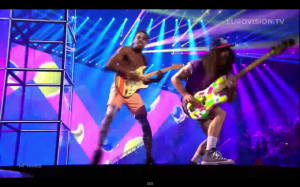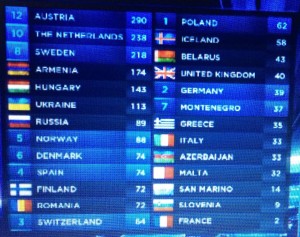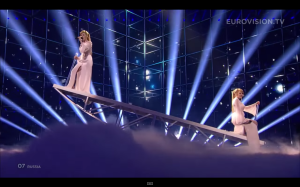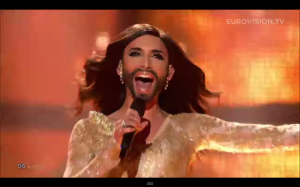Eurovision in Review: Part 1 – Austria Wins!

It’s official! At around 11.25pm (BST) last night, Conchita Wurst of Austria won the 59th Eurovision Song Contest which was being held in Copenhagen. It was a well deserved victory for the Austrian drag artist who had narrowly missed out on competing for Austria in 2012 when she came second in the national selection with ‘That’s What I Am’. Conchita had also faced a backlash from certain people particularly in Eastern Europe in the run up to the contest when petitions originating from Russia, Belarus and Ukraine suggested that Conchita should either withdraw or those nations should not have to broadcast her entry. On the night, Conchita received rapturous applause for her Bond theme-esque entry ‘Rise Like a Pheonix and notably 8 points from Ukraine, 5 points from Russia and a whole host of other high scoring points ending the night with a winning total of 290. With the dust settling across Europe, and hangovers very slowly lifting – let’s take a preliminary look at this year’s Eurovision Grand Final!
Staging, introduction and postcards
You can’t deny that the Danish did a superb job. If you compare this to the last time Copenhagen played host to the contest back in 2001, this was significantly better. A diamond stage with an interactive backdrop provided an extremely professional, slick appearance to the contest. This was used to great effect during the winning act, Austria, where it featured a phoenix rising from the flames. It was also used to great effect in many other performances – a church for Azerbaijan, Chinese lanterns for the UK, and a highway for a very intimate and subtle performance from the Netherlands.
The introduction to the contest followed the Swedish model from last year where all the acts were introduced on stage at the beginning of the contest before they took their seats in the green room, which was right in front of the stage. This is where one of the criticisms of this year’s contest comes in. It’s a challenge to hold a contest of this magnitude, but the introduction was too long. It’s Europe’s biggest television show, but the show needs to be pacey and slick. 15 minutes of introduction at the start seemed unnecessary – people want to see the songs quicker and faster, so for me – as absolutely lovely as the introduction of all contestants was, it just didn’t work.
On a more positive note the postcards (the bits shown on television before the songs are performed) were fantastic. Imaginative and classy, it was nice to see how each national broadcaster had arranged for their own flag to be ‘made’ on the screen. It was also interesting to see how different countries did this – for example Italy made a salad with leaves, mozzarella and tomatoes; Finland carved their flag out of ice. Of course this idea is nothing new – as a podcast pointed out last week, when Eurovision was last held in the UK the BBC made the different flags out of different things – i.e. Ireland’s flag was formed out of 3 tube lines and Greece’s flag was a beach towel. It is however extremely effective.

Credit to www.eurovision.tv
Performances – the winners and losers…
This is not going to be one of those reviews where each country is taken in turn. However there are some comments to be made about the best and worst performances of last night. Firstly let’s take Poland who came 14th. I think their performance was one of the winners of the night, and a lot of people picked up the phone and voted for them. Personal opinion aside (I never rated it), the song was good enough to stand out. With outfits that left very little to the imagination, a decent song and a novel way of churning butter at the front of the stage. This was a winner on the night. Another big winner was The Netherlands whose intimate performance wowed everyone. With a two person microphone, dark stage and effective staging that put them close together, yet on totally opposite sides of the road – this was a superb entry and deservedly came second. I also thought winners on the night included Denmark, Hungary and Switzerland. All three nations put in pretty spectacular performances with messages varying from serious to more light hearted. However these nations made the most use of the stage and the camera work to put in great performances finishing 9th, 5th and 13th respectively. Of course another big winner on the night, is the winner – but more on that later….
As for the night’s losers, the worst performances of the night I felt included Italy and France who finished 21st and 26th respectively. There are some performances you just don’t ‘get’ and I thought they fitted that category. France had some shambolic stage directions that just didn’t seem to work, whilst Italy’s staging was so ‘bling’ in white and silver it totally detracted from what was a reasonably good song. Unfortunately another loser in the performance stakes was United Kingdom who despite a massive improvement from previous years just didn’t seem to connect enough with the audience and finished a disappointing 17th. The penultimate losers in the performance stakes are Montenegro and Malta who finished 19th and 23rd respectively. I have admired both songs for a long time, but Montenegro had an ice skater on stage which totally detracted from what was a beautiful mid-tempo ballad. In addition Malta’s performance was ‘solid’ but not inspiring. It just didn’t work on the night unfortunately. A final mention goes to long standing favourite Armenia. They finished 4th. This was a strong song, but Aram mp3 could never sell that song enough to make any real challenge to the very top of the scoreboard. He needed to engage with the audience more to get more on the night – I’ll be honest some people at the party I attended thought he looked was little ‘scary’ and not in a good way!
Results and controversy

It became clear very early on that this was going to be a two horse race. Netherlands and Austria were challenging for the top two spots very early on, and whilst the full results will be a subject for discussion later I think some significant facts should be pointed out. Firstly Austria now holds the record for the ‘longest gap between Eurovision wins – having last won in 1966 when the world was a substantially different place. The Netherlands second placing gives them their best placing since they won in 1975, and their first top five placing since Edsillia Rombley came 4th in 1998. Similarly Hungary and Finland achieved their best ever placings in a long time. In coming 5th Hungary hadn’t had top five finish since their debut entry in 1994. Finland’s 11th place was their best placing since Lordi won in 2006.
However it wasn’t all good news. Italy and Azerbaijan both finished outside the top ten for the first time in the ‘modern’ contest (i.e. since televised semi finals were introduced in 2004) – for Azerbaijan, 22nd was their worst placing ever. Italy was just ahead in 21st place. Malta also finished at the wrong end of the scoreboard. 23rd marked their worst placing since Fabrizio Faniello came last with ‘I Do’ in 2006. Those at the other end of the scoreboard, but likely to be a lot happier are Montenegro, San Marino and Slovenia who came 19th, 24th and 25th respectively. For Montenegro and San Marino this was their first ever appearance at a Eurovision Grand Final, whilst Slovenia has only qualified from the semi finals on two other occasions since the system began in 2004 so I suspect they are more than happy. Finally whilst the United Kingdom came a disappointing 17th, it is their best placing since Blue represented the UK in 2011 and the best placing the UK has had with an ‘unknown’ name since James Fox came 16th in 2004. I think the UK can be happy with that.

Credit to www.eurovision.tv
Of course the evening wasn’t without its controversy. It would be remiss of me to ignore the booing that characterised everything Russia did or achieved on the night. Eurovision is not in theory a political contest, but given it is the one event each year that brings Europe together in a forum that is not sport, it is inevitable that politics will always play its part. I was extremely pleased that the Tolmachevy sisters were not booed for their performance. I did feel for them however when the booing started during the voting. Given the adverse reaction to Russia (not to the girls) you would have to question the wisdom of starting the voting with a country that was going to give Russia twelve points. However, whilst I have every sympathy with the Tolmachevy sisters, Russia’s record in the Ukraine and on gay rights at the moment is in my opinion, one worth highlighting. What better stage for the popular audience to highlight this by voicing their discontent on Europe’s biggest stage? Russia finished 7th thanks to some generous voting not just from Eastern Europe, but other countries too (Belgium gave them 8 points for example), thus proving in a way that this was not held against the girls personally.
Other controversy came with the revelation that Georgia had its jury votes annulled last night. This came after the EBU decided it was a ‘statistical impossibility’ that the Georgian jury would award 1-12 points to exactly the same acts in exactly the same order. Jurors are supposed to act independently of one another, and this clearly demonstrated that there was more than a possibility that the Georgian jurors had not. Therefore just the Georgian televoting results were used.
And finally… the winner!

The first time I had heard about the controversy surrounding Conchita Wurst was when I attended the London Preview Party about a month ago. I was in the crowd chanting Conchita’s name afterwards, and she graciously posed for selfies with some fans at the end of the evening as well. I could not be happier for a more deserving act. This victory is a complex thing. Firstly, would she have won without the controversy? Possibly not, the controversy is what has brought so much publicity to Conchita’s door. Whilst some may argue about whether all publicity is good publicity the facts speak for themselves. Only four countries did not vote for Conchita last night. Secondly, would she have won if the song wasn’t any good. Definitely not. This is a song contest. Drag artists have entered before – Sestre in 2002, DQ and Verska in 2007. Verska is the only act to have done anything out of those three and even then the song was a blatant second, being too novelty to go that step higher. This was an excellent song, an extremely good tune that would not be out of place in the latest Bond film. The clear thing here is that Conchita entered the contest as a credible, serious artist. She was no novelty act like the other drag artists before her had blatantly been.
Finally, would Conchita won if the performance hadn’t been any good? Again no. Her performance last night was flawless. The Bond-esque red and gold backing that gathered pace forming a phoenix that rose from the ashes towards the end of the performance was a stroke of genius. This was a performance where the attention of the audience was focused for those three minutes on the song, with the staging complimenting that, not the other way round as has happened with previous winners (Latvia 2002 I’m looking at you).
In conclusion the only thing the people who opposed Conchita’s entry into this contest ever did was create their own self fulfilling prophecy. They showed themselves up to be people who based their opinions on lifestyles and appearances instead of the actual person, and in turn gave Conchita a powerful platform with which to publicise her song across Europe before the contest. All the other ingredients were there, they just gave her the spark that enabled the ultimate success in a year where victory was blatantly there for the taking. There were too many good songs that needed something special to stand out from the crowd. In securing victory however Austria and Europe now send a powerful message to certain countries within our own sphere that this continent embraces difference and equality in all its forms which I thoroughly support.
Eurovision in Review continues later this week with a detailed look at voting – how 50/50 is it?
